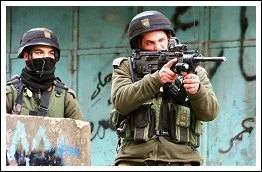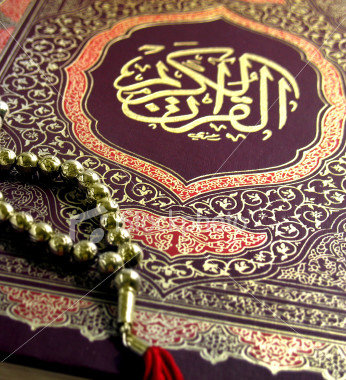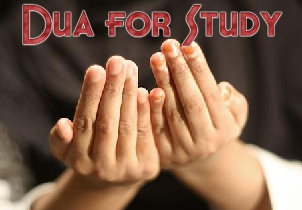Posts Tagged ‘Islamic supremacy’
- In: All | Allah الله | Hadith/Sunnah | Islam | Mohammad | muhammad | Prophet Muhammad [pbuh]
- 4 Comments
The Sunnah in Performing “Ablution”

1. Mentioning the name of Allah-In the Name of Allah, the Most Beneficent, the Most Merciful [saying: bismillah ar-Rahman ar-Rahim]
2. Washing the hands thrice.
3. [Starting by] Rinsing the mouth and nose before washing the face.
4. Rinsing the nose by one’s left hand. This is because it is mentioned in the hadith that the Prophet (peace and blessings be upon him), “washed his hands thrice, then he rinsed his mouth and washed his nose with water by putting water in it and blowing it out, and he washed his face thrice…) [Narrated by Bukhari and Muslim].
5. Exaggerating in rinsing one’s mouth and nose if not fasting by moving water around the mouth and snuffing water to the end of one’s nose. This is because of the hadith, “…and snuff with water well except when you are fasting”. [Sunan al-Tirmidhi, Abu Dawoud, ibn Maja and An-Nasa’i].
6. Rinsing one’s mouth and nose with the same handful of water. This is because of the hadith, “He [the Prophet] put his hand [into the vessel containing water] rinsed his mouth and his nose”. [Bukhari and Muslim].
7. Using tooth stick [Ar. Siwak] before rinsing one’s mouth. The Prophet (peace and blessings be upon him says, “Had I not thought it difficult for my Ummah, I would have commanded them to use the Siwak (tooth-stick) before every Prayer.”[Narrated by Ahmed and An-Nasa’i].
8. Running one’s wet finger through the beard upon washing the face. It is mentioned in the hadith that the Prophet (peace and blessings be upon him used to run his wet finger through his beard while performing ablution. [Al-Thirmithi].
9. Wiping over one’s head. This is performed as follows: passing one’s wet hands over the head from front to back and so forth. As for obligatory wiping over one’s head, it is to wipe over one’s head in any way. It is narrated that the Messenger of Allah used to pass his hands over his head [in ablution] from the front to the back. [Bukhari and Muslim].
10. Running wet fingers between the fingers and toes. The Prophet (peace and blessings be upon him) said, “Perform your ablution perfectly and let water to run between the fingers [and toes]”.
11. Washing the right [limb] before the left. It is narrated in the hadith that the Messenger of Allah (peace and blessings be upon him): “Used to start from the right side on wearing shoes, combing his hair, cleaning or washing himself and on doing anything else” [Bukhari and Muslim].
12. Performing the actions thrice when washing the face, hands and foot.
13. Saying the two testifications of faith [Ar.Shahadatan] after finishing ablution. Meaning, to says, “I testify that there is no god except Allah and that Muhammad is His Messenger”. It is narrated that the Prophet (peace and blessings be upon him) said, ” If anyone amongst you performs the ablution perfectly and then says: I testify that there is no god but Allah and that Muhammad is the servant of Allah and His Messenger, the eight gates of Paradise would be opened for him and he may enter by whichever of them he wishes”. [Muslim]
14. Performing ablution in one’s house. The Prophet (peace and blessings be upon him) said, “Whoever purifies in his house and walks to the mosque to perform obligatory prayer, his steps are counted as one expiates a sin and the other raises his rank” [Muslim]
15. Passing one’s hand over the limb while or after washing.
16. Using little amount of water. The Prophet (peace and blessings be upon him) used to use little amount of water in ablution. [Narrated by Bukhari and Muslim]
17. Washing above the limits of the four limbs [hands and foot]. It is narrated that Abu Huraira (may Allah be pleased with him) performed ablution, he washed his arm up to the elbows and his feet up to the ankles and said: this is how the Messenger of Allah (peace and blessings be upon him) performed ablution”. [Muslim]
18. Performing two rak’ahs [Eng. Units of prayer] after ablution. The Messenger of Allah (peace and blessings be upon him) said, ” He who performs ablution like this of mine and then stood up (for prayer) and offered two rak’ahs of prayer without allowing his thoughts to be distracted, all his previous sins are expiated” [Narrated by Bukhari and Muslim]
In a report by Muslim through ‘Uqba ibn ‘Amir: “He will be rewarded by nothing except Paradise”.
19. Perfecting one’s ablution: washing each part perfectly. Muslims vary in times of performing ablution during the day, and everyone has to observe these Sunan in every time he performs ablution.
Virtue of observing the above Sunan:
The Prophet (peace and blessings be upon him) said, “He who performed ablution perfectly, his sins would come out from his body, even coming out from under his nails.” [Muslim].
Dhul-Hijjah
Posted on: November 21, 2009
- In: All | Allah الله | Islam | Ramadaan
- 5 Comments
Dhul-Hijjah
The month known as Dhul-Hijjah. Our hearts and prayers are with those undertaking the difficult pilgrimage during these days. For those of us who are not performing the Hajj, there are still many ways to make the most of this blessed time!

Virtues of the first 10 Days of Dhul-Hijjah
How many times have we heard Surat Al-Fajr recited, be it in our homes, while memorizing, or in the mosque? As a shorter surah, it may be a frequent part of our prayers, but taking the time to reflect on even a part of the first verse reveals a treasure of meaning. In the first two ayahs (verses) of Surat Al-Fajr Allah says:
وَالْفَجْرِ وَلَيَالٍ عَشْرٍ
“By the dawn; And the ten nights…”
According to scholars of the Qur’an, the days mentioned as significant enough for Allah to swear by them are the first ten days of Dhul-Hijjah.
Describing how these ten days are among the best, the Prophet (peace and blessings of Allah be upon him) said:
“There are no days on which righteous deeds are more beloved to Allah than these ten days.” They said: “Not even jihad for the sake of Allah?” He said: “Not even jihad for the sake of Allah, unless a man goes out himself for jihad taking his wealth with him and does not come back with anything.” [Bukhari, 2/457]
The Prophet (peace be upon him) also said: “There is no deed that is better before Allah or more greatly rewarded than a good deed done in the (first) ten days of al-Adha.” He was asked: “Not even jihad for the sake of Allah?” He said: “Not even jihad for the sake of Allah, unless a man goes out himself for jihad taking his wealth with him and does not come back with anything.” [Al-Daarimi, 1/357]
Thus, the ten days are better than all other days of the year, with no exception, even the last ten days of Ramadan. (The last ten nights of Ramadan, however, are understood to be better than the nights of Dhul-Hijjah, because they include Laylat al-Qadr (the night of power), which is better than a thousand months [Qur’an, 97:3]).
Therefore, whoever is not able to go to Hajj should use this blessed time to complete even more righteous deeds than usual. These can include anything such as giving charity, honouring one’s parents, upholding the ties of kinship, and enjoining what is good and forbidding what is evil. Fasting and remembrance are particularly recommended:
1. Fasting Nine days, especially on the Day of ‘Arafah:
It is Sunnah for the Muslim to fast on the first nine days of Dhul-Hijjah, because fasting is one of the best of deeds. In a hadith qudsi, Allah says: “All the deeds of the son of Adam are for him, except fasting, which is for Me and I shall reward for it.” [Bukhari, 1805.]
The Prophet (peace be upon him) used to fast on the first nine days of Dhul-Hijjah. The Prophet (peace be upon him) said, “The Prophet used to fast on the first nine days of Dhul-Hijjah and the day of Ashura, and three days each month, the first Monday of the month and two Thursdays.” [Abu Dawood 2/462]
The ten days of Dhul-Hijjah include Yawm al-`Arafah (the Day of `Arafah), on which Allah perfected His Religion. The Prophet (peace be upon him) said:
“Fasting the day of `Arafah expiates the sins of two years: the past one and the coming one. And fasting the day of Ashura expiates the sins of the past year.” [Muslim]
2. Remembrance
It is Sunnah to recite remembrances known as the takbeer, tahmeed, tahleel, and tasbeeh during the first ten days of Dhul-Hijjah, saying these words out loud in the mosques, homes, streets and every place in which it is permissible to remember Allah:
* Takbeer: Allahu akbar (God is most great)
* Tahmeed: Al-hamdu Lillah (All praises be to God)
* Tahleel: Laa ilaha ill-Allah (There is no god but Allah)
* Tasbeeh: Subhaan-Allah (Glory be to God),
The Prophet (peace be upon him) explained how,
“There are no days that are greater before Allah or in which good deeds are more beloved to Him, than these ten days, so recite a great deal of tahleel, takbeer and tahmeed during them.” [Ahmad, 7/224]
While there are different versions, the takbeer can also be recited as follows:
Allahu akbar, Allahu akbar, laa ilaaha ill-Allah, Allahu akbar, wa Lillaah il-hamd.
Allah is Most Great, Allah is Most Great, there is no god but Allah; Allah is Most Great and to Allah be praise.
TERRORISM
Posted on: October 2, 2009
- In: All | Allah الله | Islam
- Leave a Comment

TERRORISM

The word terrorism was first time used in 1970s during the french revolution!! It was used to describe the french regime!!
Starting with the 19th century!!
hardly any terrorist attacks have been done by Muslims!!
I would just mention some attacks!!
Year:1881
Tsar Alexander2 was assassinate in a bullet proof carriage.
location: st peter’s berg street
innocent people killed: 21
involvement: Ignacy (non muslim)
Year:1886
Bomb blast took place during the labout rally.
location:Haymarket chicago
innocent people killed: 12
involvement: 8 anarchist(not Muslims)
20th century..
Year:1901 (6 sept)
US president William McKinley was assassinated.
involvement: Leon (anarchist not Muslim)
year:1910 (1st October)
Bomb blast in Los angles newspaper building.
Location: Los angles
innocent people killed:21
Involvement:James and Joseph (Christians)
year:1914 (28th june)
Archduke of Austria and wife were assassinated which precipitated the world war 1.
Involvement:young Bosnia(terrorist group),who were serbs(non Muslims).
year:1925 (16th April)
Bomb blast in st.Nedelya church
Location: Sofia (capital of Bulgaria)
innocent people killed: more than 150 (more than 500 injured)
Involvement: Bulgarian communist party (non Muslims)
year:1934 (9th October)
King Alexander1 of yugoslavia was assasinated.
Involvement:Vlada Georgeiff (non muslim)
Year:1961
The first American plane hijacked.
Involvement:Ortiz (non Muslim)
year:1968 (28th august)
The US ambassador to Guatemala was assassinated.
Involvment: non Muslims.
year:1969 (30th july)
The US ambassador to Japan was assassinated.
involvement: non Muslim Japanese.
year:1969 (3rd september)
The US ambassador to Brazil was kidnapped.
Involvement: Non Muslim Brazilian.
year:1995 (19th April)
Federal building was bombed.
Location:Oklahoma city
innocent people killed: 166
Involvement:Initially the media showed in the news “Middle east conspiracy”and created a hype later we came to know it were 2 right winged activists Timothy and terry(Christians) who were responsible but the media just showed it for a couple of days!
year:1941-1948 (after world war)
259 terrorist attacks were conducted by Jewish terrorists.
involvement: Ignun, stern gang, Hegana (terrorist organizations)
eg:
year:1946 (22nd july)
Bombing of king david hotel
involvement:Ignun (leader menachem Begin)
innocent people killed: 91(28british 41 arabs 17jews 5 others)
The person responsible “menacham begin later on became the president of isriel aftr som more years.he gets a nobel prize for peace lolzz!!
Before 1945 Israel did not exist these Jewish groups kicked the Palestinians and formed Israel and now when Palestinians r fighting for there land they say Palestinians are terrorists !!
year:1968-1992
Baader meinhoff gang killed hundreds of innocent ppl.
location: Germany
killing of hundreds of people.
kidnapping of the prime minister of Italy and killing him.
Location:Italy
involvement:Red brigades (non Muslims)
year:1995 (20th march)
tried to kill thousands by the nerve gas in Tokyo subway.
Location: Tokyo (japan)
innocent people killed:12 (more than 5000 injured)
involvement: Aum shinrikyo ( Budhdhist)
The IRA Irish republican army is conducting attacks in UK for 100 yrs they are Catholics but they are not called catholic terrorists but only IRA.
Year:1972
3bomb blasts were done.
innocent people killed: 1st attacks-7,2nd-11 . 3rd-9.
Location:UK
Involvement:IRA
Year:1974
2bomb blasts were done.
Location:Guild for club,Birmingham club.
Innocent prople killed:5 killed (more than 40 injured), 21 killed (182 injured).
Involvement:IRA
year:1996
a bomb blast wa done!
Location:London
Innocent people killed:2 (more than 100 injured)
Involvement:IRA
year:1996
bomb blast in shopping center.
Location:Manchester
innocent people injured: 206
Year: 1998 (august)
Banbridge bomb blast
People injured:35
Year: 1998 (august)
Omag bomb blast
Innocent people killed:29 killed (more than 330 injured)
In Spain and France Terrorist organization is ETA conducted more than 36 attack!
In Africa there are many terrorist groups but the most dangerous is the “Lord’s salvation army” (a christian group) they train young children to do terrorist attacks.
In sri lanka we have LTTE (tamil tigers, hindus) supposed to be the most notorious most violent.but no one calls them Hindu Terrorists.
In India we mostly hear of Kashmir militants, people only know the Muslim terrorist, no one knos the other groups, Why?? because of the media!!
In India there are almost terrorist organizations of every religion!!
Sikh organisation-brindan vala group.
Indra gandhi was assasinated by a sikh…Rajiv gandhi was assasinated by hindus!!
If you go on “south asian terrorism portal” largest website on terrorism(run by non muslims) you will find muslim Terrorist attacks in minority.But that is nevr highlited in the media.
North east India:
ATTF(all tripura tiger force) christian group.
NLFT(national libration front o tripura)christian
they have killed hundreds of hindus
Year:2004 (2nd october)
innocent people killed:44 Hindus
Involvement:christian groups
In Assam
Ulfa(Hindu group):From 1990 to 2006 have conducted 749 terrorist attacks.(trained to target Muslims) But in the news paper we just come to know about the Kashmiri militants..
The Moists (biggest terrorist in India)
In nepal:Moists have conducted 99 terrorist attacks in seven years(1999-2006), they are present in 150 districts o India and have conducted attacks in 1/3 parts o India.
Times of India report: 875 rockets and 30 rocket launchers which were supposed to be supplied to the moists were intercepted by the police.
Martin Luther King was assianated By NON muslim..
“Hitler” Who was a christian killed 6 million jews.
“Joseph stalin also called Uncle joe” who is a christian has killed 20million people including 14 million who were starved to death.
“Mao Tse Tsung” in china has killed more than 15 million people.
The brutality on millions of black pplz and making them slaves, treating them more worse than animals,, was done by NON muslims..
“Benito Mussolini” has killied around 400,000 people in italy.
“Maximilien Robespierre” after whom the french revolution is named has starved and killed more than 200,000 people and executed more than 40,000.
“Ashoka” in the battle of kalinga alone killed more than 100,000 people.
“George Bush” the Biggest terrorist has killed Half a million children in Iraq and millions of more in Iraq Afghanistan etc.
These are just a FEWWWW examples…!!
IF terrorism mean terrorising innocent human beings then no muslim shud be a terrorist because it is prohibited in islam.
Quran, ch5 v32 :If any human being kills another human being(muslim OR non muslim both) unless it be for murder or for creating corruptionm in the land it is as though he has killed the whole of humanity.
and If you save a single life it is as though you have saved the whole humankind.
And
act righteously with parents, and also with your relatives and the orphans and the needy and the neighbors who are related to you and [also] the neighbors who are not related to you, and the companions by your side and the travelers…” (Al-Nisa’ 4: 36)
It must be noted that the Qur’an has directed us to act righteously with all those that have been mentioned in the verse without any qualification of their religion or beliefs.
see,,
Islam is against HATE AND terrorism.!!
Jihad (Fighting for the Cause of GOD Almighty) started with the Bible..
“All who would not seek the LORD, the God of Israel, were to be put to death, whether small or great, man or woman. (From the NIV Bible, 2 Chronicles 15:13)”
– *IM*
![]()



![]()











































 Oh Allah,Please Forgive me
Oh Allah,Please Forgive me Ex-Christians-Now Muslim,Alhamdulillah
Ex-Christians-Now Muslim,Alhamdulillah I Love My Prophet Muhammad s.a.w
I Love My Prophet Muhammad s.a.w
















![Fake Grave of Prophet Muhammad [pbuh]](https://islamgreatreligion.files.wordpress.com/2009/07/prophet_muhammad_pbuh_tomb4.jpg)


















Recent Comments